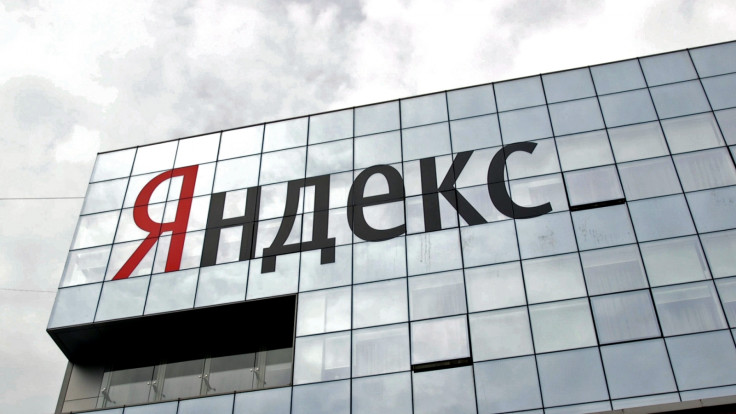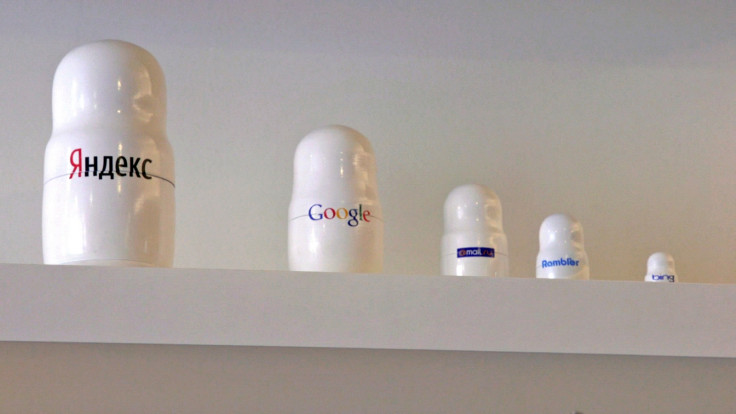Yandex: Inside the Russian company that claims to be better than Google
Can a company that bases all its solutions around artificial intelligence manage to take over the world?
It's a sunny day in Moscow and we've been stuck in a traffic jam for 45 minutes. Occasionally the taxi moves a couple metres before being forced to halt again on yet another one-way road. There's nothing we can do but sit and wait. None of the other drivers can even be bothered to beep their horns, and women and boys walk between the cars offering flowers for sale.
The traffic conditions we're currently experiencing are known as "an 8", according to the navigation app the taxi driver is using. On the screen, the road we're on is covered by a large red arrow.
"An 8" means the traffic conditions are pretty bad, so congestion and long waits on the roads is likely. Talking about the traffic using a number has become second nature to taxi drivers in Moscow, due to the Traffic Mark app developed by Yandex, which ranks how bad congestion is on a scale from one to 10, updated every 30 seconds using data collected from all the smartphones in cars in the city that run Yandex apps.
Yandex is the company we've travelled to see in order to get an inside look at the Russian tech giant that claims to be better than Google.
What exactly is Yandex?

The Yandex search engine web portal was launched in 1997 by school friends Arkady Volozh and Ilya Segalovich, who were working at the time on search technologies for patent documents and the Bible for Comptek International, before being spun off to become an independent company in 2000.
Today, Yandex employs over 6,000 people in 17 offices and has a presence in nine countries. Its four main markets are Russia, Belarus, Kazakhstan and Turkey (Ukraine used to be a major market too, but has recently blocked many Russian apps and services).
In addition to the search engine and webmail, the firm offers maps, navigation and almost real-time traffic apps; cloud storage; an app-based taxi firm Yandex Taxi that launched two years before Uber; real-time weather predictions service Nowcast; Yandex Music on-demand music streaming and digital music purchases; new and second-hand car sales site Yandex Auto; real estate sales site Yandex Realty; movie content streaming and social platform Kinopoinsk; and content recommendation and publishing platform Zen.
It would be easy to compare Yandex to Google – they are both big tech companies, they both revolve around search, they have expanded to offer many other services that are dominant in their key markets, and they are both interested in artificial intelligence. But Yandex fervently disagrees.
"People often refer to Yandex as the Google of Russia. This is only about 50% true, as only 50% give or take of our revenues come from search. We see ourselves as the Silicon Valley of Russia," says Yandex's chief technology officer Mikhail Parakhin, a machine learning expert who worked on Microsoft's Bing for seven years.
"Our search engine launched roughly one year before Google. And when it comes to mapping, we believe we have perfected the technology for maps. Google had to buy Waze because it had extra features like speed limits – Google's tech is very slow and Waze is very expensive. For the same money, we can be much cheaper, more accurate and we have speech recognition."
So if it's not a Russian Google, then what is it?










"Yandex is an artificial intelligence company... we use machine learning technology to make very intelligent products," Yandex's chief evangelist Andrey Sebrant tells IBTimes UK.
"We started with search, but as the internet evolved, search became a very complicated task, because people don't just want information. They don't want to know about taxi cab companies when you ask for a taxi – you want this cab to arrive and take you somewhere. So that's why we started providing solutions, not just information."
Every single one of Yandex's many services depends on machine learning, which is a type of computer science that governs how machines are able to process data and gain insights from it that might be useful to humans.
"There is no product that doesn't use AI in some shape or form," says Yandex's head of machine intelligence and research Misha Bilenko. "Everything Yandex does informs some form of prediction – for search results, to detect spam in emails, for the weather, for targeted advertising, to calculate disc usage in cloud storage, to predict the best routes for the taxi app, or which car to dispatch, or even authenticating the driver logging into the taxi app."
A big fish in a small pond

There's no denying that Yandex is innovative with its technologies and ideas – for its latest offering, the firm wants to "revolutionise publishing" with a content recommendation and publishing platform called Zen.
The service leverages the millions of users who go to the Yandex search engine homepage and recommends them customised content they might like, and now that the service has 6 million active users daily, it wants to allow anyone to publish their content directly to the platform.
Zen is a brave idea, as the Russian tech firm is going up against all the big players who want to decide what the general public looks at, from social media networks like Facebook and Twitter's "Trends" to apps like Flipboard and Apple News, to social link aggregation sites like Reddit and Drudge Report.
Yandex is seeking global expansion of its services, and it might be the big fish in Eastern Europe, but there's no guarantee its approach will work in the Western and Asian markets, which are already saturated with other content aggregation apps.
"What Yandex is trying to do is pick certain things. We believe we're best in the world in things like super image resolution or weather predictions. In terms of global expansion, we identify the narrow areas we believe we are better in and others can't easily catch up, and then drive those areas," explains Parakhin.
"For example, with our navigation apps, you go after taxi drivers, professionals, you do special things no one else does for them, that's what we're doing in France. When you see everyone is using this map software in taxis, then everyone else will slowly adopt it."
But where's the trust?

The technology sounds interesting, and probably there's some truth to Yandex's claims that it has always been ahead of the curve compared to the big tech brands we know. However, it's unfortunate that there is a great deal of mistrust when it comes to anything that comes from Russia.
There's rising Russian political tensions with the West, as well as increasingly frequent accusations made by governments and the media about nation state hacking. And that's not including Russia's long-standing underground malware industry.
It's not the most reassuring of reputations, and as most of Yandex's services need to collect user data, how can people outside Russia feel safe using its products?
"Yandex is 80% owned by US investors, half of the board is American. Biggest investors are in US and London. The Russian government has no access to our servers. We are much stricter than Google about access to our systems and unless there is a court subpoena we will not provide access," stresses Parakhin.
But more importantly, Yandex knows that it can't afford to mess this up, in an era where the general public has never been more aware of government surveillance and data collection than they are today.
"All our services are based on trust. It is always one click on the net. If you don't trust the service, you start using competitors who you trust more," says Sebrant.
"So for us, the question of meeting these expectations from the users is the reason for survival. We will not survive if we fail to meet expectations, so we know people expect us to be honest, expect us to keep their secrets, to keep their data. We simply cannot fail."
© Copyright IBTimes 2024. All rights reserved.























